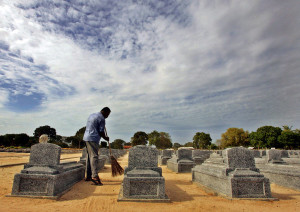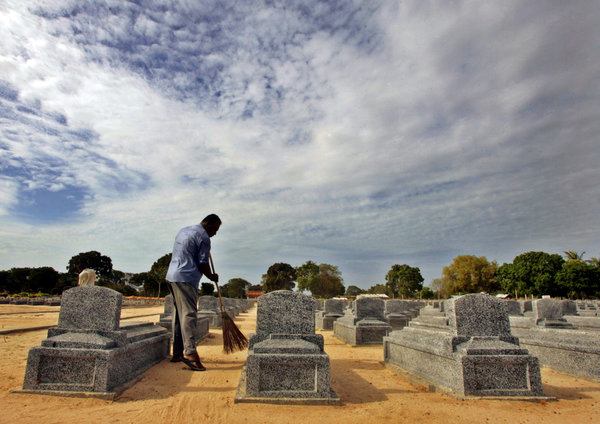 |
|
Kamal Kishore/Reuters — Corbis,Tamil man sweeping at a mass cemetery of Tamil Tigers.
|
By AATISH TASEER
FOUR years ago this week, the Liberation Tigers of Tamil Eelam announced that their struggle for an independent homeland in northern Sri Lanka had “reached its bitter end.” The group had been fighting on behalf of the Tamil people for more than a quarter-century, and its defeat was absolute.
Today, great sections of Tamil country are still a scene of devastation. The houses are either destroyed or brand-new; the land is uncultivated and overgrown; there are forests of decapitated Palmyra palms, damaged by heavy shelling. And then there are the relics of war — graveyards of L.T.T.E. vehicles rotting in the open air; the remains of a ship, its superstructure blown to pieces and in whose rusting starboard a gaping hole gives on to blue sea.
When I first arrived there last March, I saw the loss in primarily military terms. But the feeling of defeat among the Tamils of Sri Lanka goes far deeper than the material defeat of the rebels. It is a moral and psychological defeat.
In that forested country of red earth and lagoons, it is possible to visit the bunker of the leader of the Tigers, a torture chamber of a place that sinks three levels into the ground. There, in the fetid air, infused with the smell of urine and bat excrement, one senses the full futility and wretchedness of what the rebel movement became in the end.
For the truth is that the Tamil defeat has less to do with the vanquishing of the L.T.T.E. by the Sri Lankan Army and much more to do with the self-wounding (“suicidal” would not be too strong a word) character of the movement itself. The Tigers were for so long the custodians of the Tamil people’s hope of self-realization. But theirs was a deeply flawed organization. Under the leadership of Velupillai Prabhakaran, the Tigers pioneered and perfected the use of the suicide bomber. This was not simply a mode of warfare, but almost a symbol, an expression of a self-annihilating spirit. And it was to self-annihilation that Mr. Prabhakaran committed the Tamils. He was a man who, like a modern-day Coriolanus, seemed to lack the imagination for peace. He took the Tamils on a journey of war without end, where no offer of compromise was ever enough, and where all forms of moderation were seen as betrayal.
One evening, soon after I arrived in Jaffna, the capital of the northern province, I had dinner at the house of a woman whose sister had been part of a circle of academics who had published a book in 1990 called “The Broken Palmyra.” The book was, by no means, a simple polemic against the Tigers; it was an academic work that, in trying to be evenhanded, had taken account of both government and L.T.T.E. atrocities. But this was too treasonous for Mr. Prabhakaran, and my host’s sister was killed even before the book went to print.
The room that night was filled with people whose lives the tyranny of the L.T.T.E. had left forever scarred. There was the Muslim woman who, along with all the other Muslim families of Jaffna, had, one morning in 1990, been summoned to a school compound and given two hours to leave the city of her birth. They were told to leave behind their valuables and the deeds to their houses. When they asked why they were being expelled, they were told that they were lucky not to be killed. Then they were loaded into lorries and escorted to the border of the district. (Like most, this woman returned only after the end of the war in 2009.)
A middle-aged woman, working as a maid in the house, had more recent traumas. Her son had gone to work with his uncle, a carpenter, in the northern district of Kilinochchi, which would become the scene of an infamous battle. When war came, it was Mr. Prabhakaran’s express strategy to retreat with an enormous civilian population — 300,000 people, some say — and to use them as a human shield against the advancing army. It was his intention to let so many Tamils die that the international community (read, the West) would be forced to intervene, and the Tamils would be granted their homeland.
But here he made a grave mistake: he either overestimated his own importance; or else, the West’s sense of decency. For the West, occupied with problems more pressing, let as many Tamils die as had to die for the war to be won.
This was an added layer of shame in the Tamil defeat. It was not just that they had lost the war. It was also that the grass-roots movement they originated, and for which they had paid taxes and sacrificed able-bodied men and women, had, in the end, been more vicious to them than to anyone else.
When I asked what became of the woman’s son, she replied that he had not come home. “He’s dead,” my hostess clarified, “but she doesn’t like to hear that.”
THE north of Sri Lanka today is a spectacle of Sinhalese triumphalism. A victorious army is rebuilding new roads, grabbing land for itself (6,000 acres, rumor has it), and displaying the spoils of war before tourists from the south.
Even when the government of President Mahinda Rajapaksa acts magnanimously toward the Tamil people, by building new infrastructure projects, for instance, the Tamils seem to feel that their defeat is being rubbed in their faces. And they are not wrong. It is simply one of those intractable situations where nothing will feel right. For the loss the Tamils feel is really the loss of a story. They are now a people without a story, a traumatized people, devastated by decades of war and migration, whose dream of self-determination was hijacked by the nihilistic vision of their leader and turned to nightmare.
“We lost something,” a Tamil artist in Jaffna, T. Shanaathanan, told me, “but we do not know what. The war is over, but there is a kind of psychological warfare now. Before, people looked at us with suspicion, with the feeling that you’re Tamil, you might be a terrorist. But now they look at us as if we’re nothing.”
Aatish Taseer is the author of the memoir “Stranger to History: A Son’s Journey Through Islamic Lands” and the novel “Noon.”
